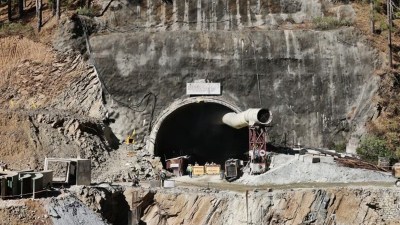Another step back
Terror is under any circumstances a reprehensible pursuit, but Thursday's twin blasts in Srinagar have left an especially spine-chilling e...

Terror is under any circumstances a reprehensible pursuit, but Thursday8217;s twin blasts in Srinagar have left an especially spine-chilling echo. It has unequivocally been made clear that the wise men in Pakistan who plot murder and carnage in Jammu and Kashmir will not tolerate even the faintest of possibilities of peace in the state. It is in this context that the escalation in violence seems more an act of desperation than of confident defiance. New Delhi8217;s alacrity in responding to the Hizbul Mujahideen8217;s July 24 offer of a three-month ceasefire 8212; and its subsequent call to all Kashmiri militants to lay down arms and secure shelter around the negotiating table 8212; is something the jehadi establishment across the border would like to consign to the history books as fast as possible. It is a motivation woven into the choice of victims: pilgrims and migrant labourers on August 1, soldiers withdrawing cash and mediapersons diligently pursuing a story on the 10th. The poignant is sought to be madeprovocative.
Therein lies a clue to the enemy the government and the people of India must watch out for: Provocation. For, the escalation in violence in recent weeks can be directly traced to the atmosphere of conciliation the Centre has been able to create. In this endeavour it has given ample proof of patience, flexibility and restraint. Post-ceasefire, these qualities must continue to imbue a firm response to the threat of increased terrorist activity. The road to peace is a three-lane highway. One, to state the very obvious, the security forces will have to have their wits about them in coming days to spy the provocative intent behind terrorist operations. For this they require a wider information-gathering web and an unblinking vigil. Two, having held out a conciliatory hand, having seen a glimmer of peace even if it seems more of a chimera in difficult times, New Delhi must keep its offer of negotiations open to all sections of Kashmiri society 8212; a fact reassuringly emphasised by the prime minister after theHizbul Mujahideen withdrew its ceasefire. To do this, to win the consent of the Kashmiri people, their grievances 8212; some very real, some extremely exaggerated by a robust propaganda machinery 8212; should be addressed. Three, for hope of peace in the region to be kept flickering, a line of communication has to be established with the Pakistani leadership.
It is this third objective that is proving to be the most elusive. Certainly, Pakistan8217;s Chief Executive Pervez Musharraf has famously voiced his commitment to Indo-Pak dialogue. But his sincerity is rightly suspect, with his words not being matched with a spirit of neighbourly friendship. Perhaps he needs to hear words of stricture from another quarter. Washington has been issuing daily pronouncements on the need to end cross-border terrorism and for the Hizb to return to unconditional talks with India. Perhaps he, or maybe the more hardline elements in his military, need to be told of the economic gains peace on the border would bring. Or maybe it is a message Pakistani leaders need to hear from their own people.
- 01
- 02
- 03
- 04
- 05































